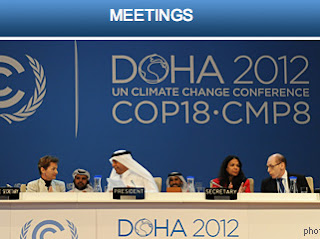 |
| Via unfccc.int |
- A second commitment period for the Kyoto Protocol. However, fewer countries are participating, and they have only agreed to reduce their overall emissions by at least 18% below 1990 levels in the eight year period (2013-2020). Participating countries represent less than 15% of global greenhouse gas emissions, and the emissions reduction commitments are insufficient to keep global warming below the 2C limit;
- Agreement to consider the creation of an international mechanism for loss and damage from extreme weather and slow onset climate impacts in developing countries;
- The need for a plan for long-term finance was reiterated. However, no firm commitments on scaling up finance towards the agreed US$ 100 billion a year were forthcoming. Climate finance pledges amounting to approximately US$ 10 billion were made by some European countries;
- Developed countries were urged to increase the ambition of their emission reduction targets and a work programme will be established to clarify pledges.
REDD+
During COP 18, progress on Reducing Emissions from Deforestation and Forest Degradation (REDD+) was limited as a disagreement on emissions verification processes resulted in a stalemate. Papua New Guinea promoted a “REDD Committee” to house future REDD talks, the aim being to create a standardised REDD product within the UNFCCC.
The Subsidiary Body for Scientific and Technical Advice (SBSTA) drafted conclusions to be addressed in 2013. These include:
- Methodological guidance for national forest monitoring systems;
- The timing and frequency of summary information on how REDD+ safeguards will be addressed and respected;
- Drivers of deforestation and forest degradation;
- A work programme on results-based finance with the aim to scale up and improve the effectiveness of finance for REDD+ activities;
- Consideration of how non-market based approaches, such as joint mitigation and adaptation, could be developed.
The SBSTA will continue to refine the REDD+ text under its remit in 2013, and it will also work on methodological issues related to non-carbon benefits and their incentivisation. The Subsidiary Body for Implementation will initiate a process to address issues of support for REDD+ activities.
No comments:
Post a Comment